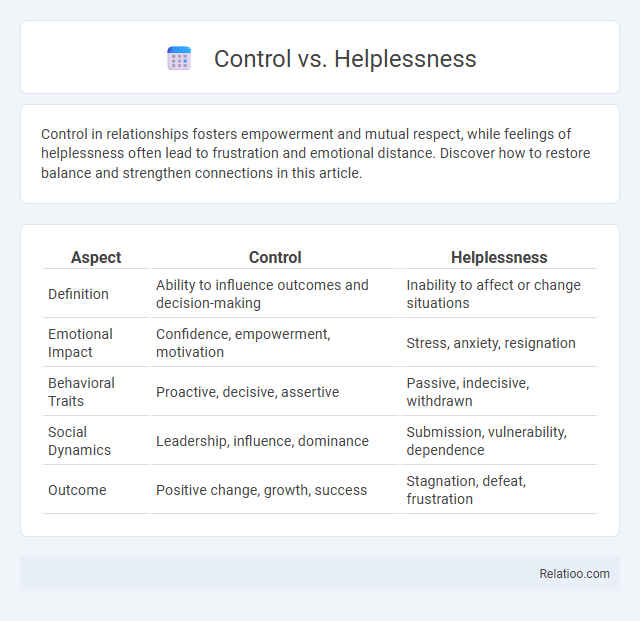Control in relationships fosters empowerment and mutual respect, while feelings of helplessness often lead to frustration and emotional distance. Discover how to restore balance and strengthen connections in this article.
Table of Comparison
| Aspect | Control | Helplessness |
|---|---|---|
| Definition | Ability to influence outcomes and decision-making | Inability to affect or change situations |
| Emotional Impact | Confidence, empowerment, motivation | Stress, anxiety, resignation |
| Behavioral Traits | Proactive, decisive, assertive | Passive, indecisive, withdrawn |
| Social Dynamics | Leadership, influence, dominance | Submission, vulnerability, dependence |
| Outcome | Positive change, growth, success | Stagnation, defeat, frustration |
Understanding the Concepts: Control and Helplessness
Control refers to the perception or belief that one can influence events and outcomes in their environment, which promotes motivation and proactive behavior. Helplessness arises when individuals feel unable to affect change, often resulting from repeated failure or uncontrollable adverse situations, leading to passive behavior. Understanding the distinction between control and helplessness is crucial for addressing psychological states like learned helplessness and fostering resilience through strategies that restore a sense of agency.
Psychological Roots of Control
Psychological roots of control stem from an individual's need for predictability and influence over their environment to reduce anxiety and foster a sense of competence. When this need is met, it promotes resilience and adaptive behaviors, but a lack of control often triggers helplessness, leading to emotional distress and cognitive decline. Chronic experiences of uncontrollability can evolve into despair, characterized by hopelessness and impaired motivation, deeply affecting mental health and well-being.
Causes of Helplessness in Everyday Life
Helplessness in everyday life often arises from repeated exposure to uncontrollable stressors, such as chronic job insecurity, persistent financial difficulties, or ongoing interpersonal conflicts. Psychological factors like low self-efficacy and learned helplessness, where individuals believe their actions have no impact on outcomes, significantly contribute to this state. Environmental conditions, including lack of social support and overwhelming demands, amplify feelings of helplessness, increasing vulnerability to despair.
The Impact of Control on Mental Health
Perceived control significantly influences mental health by reducing stress and enhancing psychological resilience. Individuals with a strong sense of control report lower levels of anxiety and depression, as their belief in agency promotes adaptive coping mechanisms. Conversely, helplessness and despair are linked to increased vulnerability to mental disorders due to diminished motivation and impaired emotional regulation.
Learned Helplessness: How It Develops
Learned helplessness develops when repeated exposure to uncontrollable and adverse events conditions individuals to believe their actions cannot influence outcomes, resulting in diminished motivation and cognitive function. This psychological state emerges through persistent failure to escape negative stimuli, eroding the perception of personal control over situations. Neurological research links learned helplessness to dysregulation in brain regions like the prefrontal cortex and hippocampus, which are critical for decision-making and stress response.
Control Beliefs and Decision-Making
Control beliefs significantly influence decision-making by shaping how you perceive your ability to influence outcomes and manage challenges. Strong internal control beliefs enhance your confidence in problem-solving and proactive behaviors, leading to more effective and adaptive decisions. Conversely, feelings of helplessness or despair often result from low control beliefs, causing indecisiveness, avoidance, or passive responses that hinder optimal decision-making.
Overcoming Feelings of Helplessness
Overcoming feelings of helplessness involves recognizing your personal control over situations and actively engaging in problem-solving strategies. Empowering yourself through small, achievable goals strengthens your resilience and reduces feelings of despair. Emphasizing realistic self-efficacy and seeking social support are key factors in shifting from helplessness to a mindset of control and hope.
Building a Sense of Personal Agency
Building a sense of personal agency empowers you to move beyond feelings of helplessness and despair by recognizing your ability to influence outcomes in your life. Developing control involves setting realistic goals, taking actionable steps, and reinforcing your belief in your own competence and decision-making skills. Cultivating this mindset enhances resilience, emotional well-being, and the capacity to overcome challenges effectively.
Social and Environmental Influences on Control
Social and environmental factors significantly shape your sense of control, influencing whether you experience control, helplessness, or despair. Supportive networks, positive reinforcement, and stable environments enhance perceived control, while isolation, unpredictability, and adverse surroundings amplify feelings of helplessness and despair. Understanding these dynamics helps in fostering resilience and promoting mental well-being by creating conditions that empower rather than diminish control.
Practical Strategies to Cultivate Control
Developing practical strategies to cultivate control involves setting clear, achievable goals and establishing daily routines that reinforce your sense of agency. Techniques such as mindfulness meditation and cognitive restructuring help reframe negative thoughts associated with helplessness and despair, promoting resilience. You can also enhance control by breaking tasks into manageable steps, tracking progress, and seeking social support to reinforce motivation and empowerment.

Infographic: Control vs Helplessness
 relatioo.com
relatioo.com